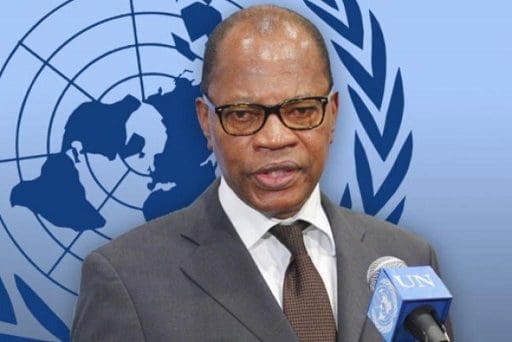The Economic Community of West African States (ECOWAS) has launched simultaneous regional consultations in Accra and Bissau aimed at charting the future of West African integration, with Ghana hosting discussions on democracy and constitutional order while Guinea-Bissau focuses on peace and security.
The three-day consultations, running from September 24-26, 2025, represent a comprehensive effort to engage citizens, civil society organizations, and stakeholders across the region in shaping what organizers describe as a “Pact for the Future of Regional Integration in the ECOWAS Community.”
The consultations are being held in the context of ECOWAS’s 50th anniversary, marking five decades of regional cooperation and integration, with the meetings organized by the ECOWAS Commission’s Department of Political Affairs, Peace and Security.
In Accra, the dialogue focuses specifically on “The Future of Democracy, Constitutional Order and Good Governance,” bringing together high-profile participants including former ECOWAS Commission President Dr. Mohamed Ibn Chambas, who currently serves as African Union High Representative for Silencing the Guns.
Dr. Ibn Chambas delivered the keynote address under the theme “The State of Democracy and Constitutional Order in West Africa,” where he warned participants that recent regional instability represents “a perfect storm where several failures have converged to create a troubling backsliding.”
His remarks reflect growing concerns about democratic governance across West Africa, where multiple countries have experienced military coups and constitutional crises in recent years. The former ECOWAS chief called for “sober reflection” and “honest diagnosis” to address what he termed “a deeper malaise” affecting the region.
The consultation brings together notable regional figures including Mohammed Lawan Gana, ECOWAS Resident Representative in Ghana, former Gambian Foreign Minister Baboucar Blaise Jagne, and former Nigerian electoral commission chief Professor Attahiru Jega. Professor Jibrin Ibrahim from the Centre for Democratic Development also participates as a senior fellow.
A third consultation is planned for Freetown, Sierra Leone, from October 14-16, 2025, focusing on “The Future of ECOWAS Partnerships and International Relations”, indicating the comprehensive scope of the regional review process.
The timing proves significant as ECOWAS faces unprecedented challenges to its founding principles. The organization has maintained a strong stance on constitutional governance, implementing sanctions against member states that experience military takeovers, but has struggled to prevent the recent wave of coups across the Sahel region.
Mohammed Lawan Gana emphasized in his opening address that the consultation should produce “meaningful dialogue, innovative ideas, and a spirit of collaboration” to shape a better future for ECOWAS citizens. He encouraged participants to challenge assumptions and develop recommendations for democratic governance and inclusive development.
The process aims to incorporate diverse voices, particularly emphasizing participation from young people, women, persons with disabilities, professional organizations, and the private sector. This inclusive approach reflects recognition that regional integration must address the concerns of all community members, not just political elites.
The consultations come as ECOWAS grapples with its relationship with member states that have experienced military governments. Mali, Burkina Faso, and Niger have all announced their intention to withdraw from the organization, creating an existential challenge for the regional bloc’s future.
These departures have prompted soul-searching about whether ECOWAS’s approach to governance and integration remains relevant to contemporary challenges. The consultations represent an attempt to adapt the organization’s strategies while maintaining core democratic principles.
Experts suggest ECOWAS should “remain steadfast in maintaining its constitutional convergence principles and zero-tolerance for changes of government through non-constitutional means”, even while adapting to current realities.
The “Pact for the Future of Regional Integration” that will emerge from these consultations faces the challenge of balancing idealism with pragmatism. Regional leaders must address citizen concerns about economic development and security while maintaining commitments to democratic governance.
Dr. Ibn Chambas’s reference to ECOWAS Vision 2050, which aims to build an “ECOWAS of the people, peace, prosperity, and good governance,” provides the framework for discussions. However, translating this vision into practical policies that address current challenges remains complex.
The consultation process reflects broader trends in regional organizations worldwide, where traditional approaches to integration face pressure from changing citizen expectations, security challenges, and shifting geopolitical dynamics.
For Ghana, hosting the democracy-focused consultation reinforces its role as a democratic anchor in the region. The country’s stable democratic institutions and peaceful power transfers provide a model that other West African nations have sought to emulate.
The outcomes of these consultations will be closely watched by international partners who have invested heavily in West African democratic development. The European Union, United States, and other partners maintain significant interests in regional stability and governance outcomes.
The success of the consultation process may determine whether ECOWAS can reinvent itself for the next phase of regional integration or whether it will face continued fragmentation as member states pursue alternative arrangements.
The involvement of civil society organizations and citizen groups signals recognition that top-down approaches to regional integration have limitations. Sustainable integration requires genuine buy-in from populations who must see tangible benefits from regional cooperation.
Source: newsghana.com.gh











